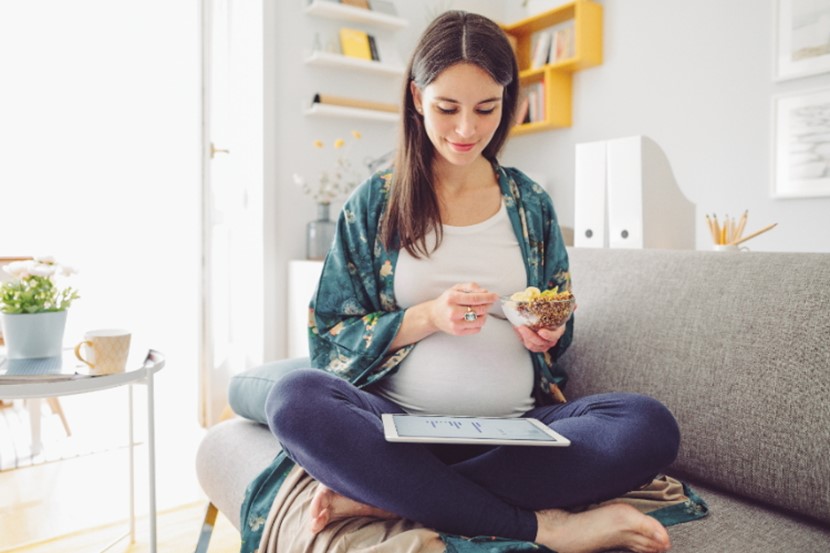Should you really be eating for two?

Dr Nick Walker on pregnancy nutrition, and whether the theory of ‘eating for two’ actually stacks up!
In a perfectly logical, but unexpectedly roundabout, way, one of pregnancy’s oldest adages is actually correct: yes, you are ‘eating for two’. Here’s why: human physiology studies have shown that energy requirements during pregnancy will increase by around 10%. Mathematically speaking (bear with me here!), a pregnant woman should eat for 1.1, or eat 10% more than she would when she wasn’t pregnant. At the end of a pregnancy, the baby’s weight is about five percent of the mother’s weight (for example, a mother who weighs 70kg might average a 3.5kg baby). Thus, the weight of two babies combined would be 7kg, meaning mothers eating for ‘two’ babies would in fact be catering appropriately for 10% extra body mass. This rather convoluted calculation may not be what the originator of that famous phrase actually had in mind, but it seems to have worked out nicely all the same, in a serendipitous harmony of old-fashioned wisdom and modern research science.
Leaving aside these thoughts, the amount of attention paid to your diet during pregnancy is certainly worth more than a few tidbits and clichés.

During your first trimester, your diet may be quite restricted by nausea, which is very common at this time. Newly pregnant mothers often report a strong desire for ‘carbs only’, usually in the form of dry crackers or white bread, and find that grazing frequently on these usually lessens their nausea. You may be concerned that by eating a lot of these foods the baby will be deprived of good nutrition, but it pays to remember that, at this stage, your baby is still smaller than your little finger, and therefore needs very few of the basic elements to survive and thrive. Fortunately, as your baby grows and requires more nutrients, your normal food tolerance usually returns. At this time, foods high in folic acid are particularly important, a fact acknowledged by the Ministry of Health recommendation that maternity caregivers prescribe folic acid supplements up until twelve weeks’ gestation, because it’s so difficult to get enough through natural food sources alone.
During your second trimester, general nutrition in the form of a balanced diet containing elements from the four major food groups will be all that’s necessary to maintain your baby’s growth and development, as well as your own health. The four groups are fruit and vegetables; bread and cereals; dairy; and lean meats and legumes. The only recommended addition is an iodine supplement, a vital mineral which is naturally low in New Zealand food sources. One tablet a day will be enough to cover any deficiency in your diet. The second trimester is usually a wonderful time because the nausea of early pregnancy has passed and you’re not yet feeling the effects of carrying a heavy baby. As I’ve mentioned, your energy requirements, in the form of calories, will be 10% above your usual amount, which will adequately cater for your baby’s growth (tissue deposition) and your increased metabolism. Your body is responding to your need to move around the greater weight, as well as pump more blood around.

In your third trimester, the most important (and most frequently deficient) nutrient is the mineral iron. Succulent steaks and juicy cuts of red meat are the most common examples of food-related sources of extra iron, but most animal meat – including fish – contains iron, as do eggs. If you’re vegetarian or vegan, make sure you manage your iron requirements carefully, though you can always use supplements regardless of your dietary habits. Once again, a balance between the major food groups is the most important and simple guide to follow.
FOODS TO AVOID
So far we’ve covered what foods to include in your diet, but what about foods to avoid?
The rationale for avoiding certain foods can be divided into three broad categories. The first is foods which may cause chemical toxicity to you and your baby; the second is foods which may cause food poisoning to the mother (whose immunity is naturally altered by pregnancy, making her more susceptible to such episodes compared to when she is non-pregnant); and the third, and most rare, is food-borne microbial diseases which may directly infect the placenta and baby.
Fish is an example of a food that fits the first category of foods that may be potentially toxic. Measurements of mercury levels found in commercially caught fish are listed and categorised by species, making it easy to choose the safest options. Fortunately, for lovers of our wonderful fresh fish, even ‘moderate risk’ species are actually okay to eat several times a week, according to guidelines from the New Zealand Ministry of Health and the Ministry of Primary Industries. It’s reassuring to know that our government continually monitors the levels of heavy metals in shellfish, because they could conceivably change over time.
FOOD-BORNE ILLNESSES
The second category, foods which may cause food poisoning, is the type that I encounter most often as a Lead Maternity Carer (LMC). Food can harbour bacterial growth, which then causes illness either directly (the bacteria themselves make you sick) or indirectly (waste products created by bacteria activity make you sick). Careful food hygiene will minimise your risks, and you should take extra care anyway, because of your reduced immunity to these illnesses when pregnant. The rule of ‘three Cs’ comes into play here: Clean, Cook and Chill. Respectively, this basically means having clean utensils and avoiding the cross-contamination of raw and cooked foods; cooking food until well-done and piping hot (particularly chicken and mince); and putting cooked, cooled food in your fridge within two hours of it cooling. Following these guidelines reduces your risk of getting diseases like campylobacter, salmonella and E. coli, which are the most common and nastiest illnesses (usual symptoms include headaches, vomiting and diarrhoea). Although these diseases are unpleasant, they are treatable during pregnancy and fortunately are not directly harmful to your baby, as long as you stay hydrated and seek appropriate medical care if your symptoms persist or deteriorate.
PREVENTING FOETAL INFECTION
The third category of foods to avoid really comes down to reducing the risk of foetal infection via either toxoplasma or listeria; two unrelated, and luckily very rare, micro-organisms. Below, I’ll outline a bit more about each, and how best to avoid them.
 Toxoplasmosis can be contracted through contact with cat poo (even from gardening), and from incompletely cooked meat products or raw meat products (for example, some fermented types of salami). Good hand hygiene and avoiding raw or incompletely cooked meat will generally keep you safe from problems caused by toxoplasma.
Toxoplasmosis can be contracted through contact with cat poo (even from gardening), and from incompletely cooked meat products or raw meat products (for example, some fermented types of salami). Good hand hygiene and avoiding raw or incompletely cooked meat will generally keep you safe from problems caused by toxoplasma.
 Listeria are bacteria which have a preference for unrefrigerated foods of varying types, from deli foods and salads to home-cooked but poorly -stored meals. Unpasteurised dairy products are also thought to be a particularly risky option, but small amounts of pasteurised soft cheeses are actually okay if eaten straight away after opening. Listeria is destroyed by heating food until it is piping hot, so as long as that is possible, you can still enjoy your leftovers! We very rarely see cases of maternal listeria disease in the hospital where I work, and this is somewhat reassuring considering the number of babies born there each year and the number of pregnant women consuming all their day-to-day meals in the community.
Listeria are bacteria which have a preference for unrefrigerated foods of varying types, from deli foods and salads to home-cooked but poorly -stored meals. Unpasteurised dairy products are also thought to be a particularly risky option, but small amounts of pasteurised soft cheeses are actually okay if eaten straight away after opening. Listeria is destroyed by heating food until it is piping hot, so as long as that is possible, you can still enjoy your leftovers! We very rarely see cases of maternal listeria disease in the hospital where I work, and this is somewhat reassuring considering the number of babies born there each year and the number of pregnant women consuming all their day-to-day meals in the community.
MYTH BUSTER
I’ll finish off with what I believe to be a myth: that vitamin supplements during pregnancy are essential. Besides the important micronutrients folic acid, iodine and iron that I mentioned earlier, medical studies have yet to determine whether other vitamin supplements have any benefit to any measure of maternal or baby wellbeing. It is an area of active research though, so keep an eye out for further information. But in the meantime, the best you can do is to maintain a balanced, varied and careful food intake. Of course, if you suffer from hyperemesis or are on a restricted diet such as vegan, then supplements could give you added peace of mind. However, as is always the case with your food, make sure it is delicious – and that you enjoy it!
Dr Nick Walker is a specialist obstetrician working in both public practice at National Women’s Hospital and private practice in Mt Eden, Auckland. He divides his time between these roles and helping his wife in caring for their four young children.

AS FEATURED IN ISSUE 47 OF OHbaby! MAGAZINE. CHECK OUT OTHER ARTICLES IN THIS ISSUE BELOW

















